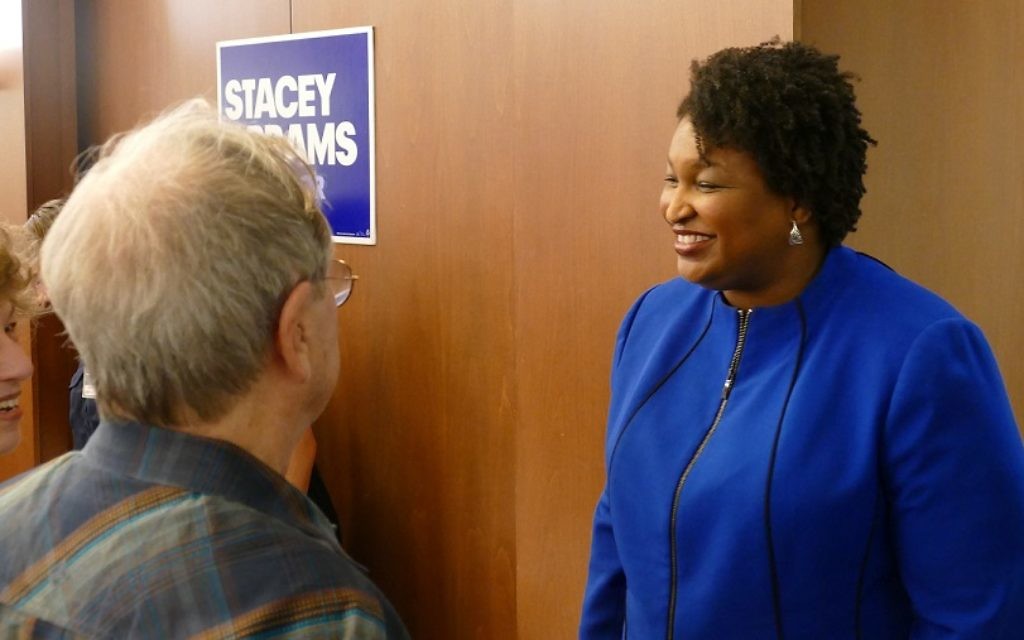Abrams Exposes Democrats’ Israel Split
It's disappointing that in 2018 support for Israel's existence isn't taken for granted.
The gubernatorial forum held by the Jewish Democratic Women’s Salon in Sandy Springs was informative but largely unremarkable — as unremarkable as possible in a contest between two women seeking a job no woman has ever held.
Democrats Stacey Abrams and Stacey Evans have given many speeches and answered many questions already, and qualifying for the ballot to run for Georgia governor doesn’t even open until Monday, March 5.
Their joint appearance before a room packed with Jewish voters Thursday, Feb. 22, came exactly three months before the primary, and they know each other’s positions well enough in the heads-up Democratic contest to lip-sync answers to standard questions. The two Staceys do have differences, so it’s worth reading what they had to say and watching them on video.
Get The AJT Newsletter by email and never miss our top stories Free Sign Up
Most of the questions were generic enough that they could have been asked at a forum held by a Rotary Club or a PTA instead of a Jewish women’s group, but when Lois Frank asked the former state representatives about their differing votes on anti-BDS legislation in 2016, she elicited what struck me later as a stunning statement from Abrams.
“I unequivocally believe in the right of Israel to exist,” the former House minority leader said. She repeated that sentence before she finished her two-minute answer (the only difference being that she reversed the order of “unequivocally believe”).
The sentiment was not surprising, and I was glad to see Abrams be so clear and forceful in her support of Israel and her condemnation of the boycott, divestment and sanctions movement for its anti-Semitism and its misappropriation of the tool of economic boycotts.
How much her words matter if she votes against legislation backing them up and if she stands with a pro-BDS, anti-Israel progressive leader such as Linda Sarsour is a question for another day (look for interviews with Abrams, Evans and other gubernatorial candidates before May 22).
What flabbergasted me was that Abrams thought such a statement was necessary — and so important that she made it twice.
In 2018, one of the leading candidates for Georgia governor sees Israel’s right to exist as an issue for debate, not an accepted reality.
“I unequivocally believe in the right of Israel to exist” should be equivalent to “I unequivocally believe that the sun will rise tomorrow” on the controversy scale.
I don’t think Abrams has any doubts about Israel’s existence, but her need to say it means she expects others in her progressive wing of the Democratic Party to disagree with her. That, in turn, is further evidence of what surveys and observation have told us: Support for Israel is no longer a given among Democrats.
Israel isn’t safe among Republicans, either, not when neo-Nazis can emerge from the muck of the extreme right to run for office as members of the GOP.
But Israel’s problem is wider and more fundamental in the Democratic Party, which remains the preferred political home for two-thirds to three-quarters of American Jews. Those on the right who hate Israel usually don’t care for the Palestinians either, but the anti-Israel left is motivated by visions of justice for Palestinians that are too myopic to see a place for a Jewish homeland and instead focus on one Arab state from the river to the sea.
The 1,000-plus members of the Jewish Democratic Women’s Salon no doubt have run into too many fellow political activists who align with them on almost every issue, only to veer away on Israel.
Abrams was smart enough about the fault lines in her party to recognize the need to deliver reassurance about which side she’s on, but the festering Israeli-Palestinian conflict is a political infection that is only going to spread.





comments